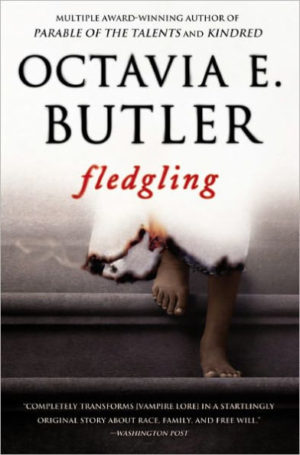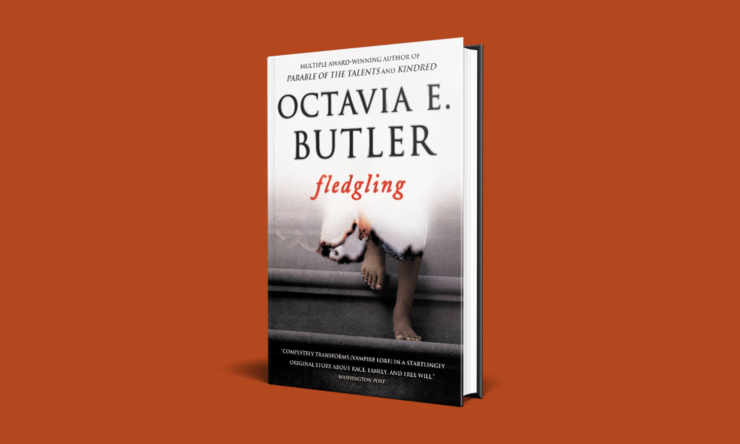In 2016, Fantastic Stories of the Imagination published my survey article “A Crash Course in the History of Black Science Fiction” (now hosted here and here). Since then, Tor.com has published thirty-three in-depth essays I wrote about some of the 42 works mentioned, and a thirty-fourth essay by LaShawn Wanak on my collection Filter House. In this column I’m taking my second look in a row at a novel by that giant of African American speculative fiction Octavia E. Butler. Previously, I wrote about Kindred, which is often the first Butler book people read; this essay’s about Fledgling, the last one she wrote.
LIGHT AS A FEATHER
Octavia described herself as “a pessimist if I’m not careful,” and much of her innate grimness shows up in her work: in Kindred in the form of slaveowners’ casual cruelties, in the apocalyptic plague of Clay’s Ark, and so on.
But Fledgling was meant to be a fun book, a frivolous romp, light and frothy. Having indulged in reading every single one of the erotically charged Anita Blake vampire novels of Laurell K. Hamilton, Octavia wanted to write something similar, but a little different. A little more scientifically rigorous. A little more Black.
So Octavia created Shori Matthews, an “Ina”—a biologically-consistent rather than supernaturally-derived vampire, armed with amazing yet credible recuperative powers. Shori can and does chase down full-grown, healthy deer on foot, can and does tear open their throats with her teeth and eat them raw. She seduces a multi-gender seraglio using sexually satisfying bites, injecting an addictive “venom” contained in her saliva—a benign venom which prolongs her partners’ lives.
Shori is Black due to the genius genetic engineering efforts of her family: by increasing their offspring’s melanin her parents have made her invulnerable to the crippling effect the sun has on other Ina. This comes in handy when Shori must deal with humans, but it has a price: many Ina find Shori’s Blackness repulsive. They loathe her as a “mongrel.” They attack her family’s home and burn it to the ground. They try to kill her and everyone she knows and loves. Shori barely survives.
LEAP AND LEARN
As even this very brief explanation of some parts of the novel shows, Fledgling is by no means a mindless piece of entertainment. Going on the available evidence, Octavia Butler was incapable of writing such a thing. Or, if not incapable of doing so, she was uninterested in it, despite her expressed desire to take a break from her customary heavy subject matter.
Buy the Book


Fledgeling
The explicit yet playful sexual content found in her models, the books of the Anita Blake series, takes on a steely patina of matter-of-fact controversy in Octavia’s clear, steady gaze. Shori appears only twelve years old to her first human target, Wright Hamlin, though she accosts him with all the self-assuredness of her actual 53 years. She takes his blood slowly, and gives him “as much pleasure as [she can].” I know of at least one dedicated fan of Octavia’s work who refused to read beyond that scene.
The racial discrimination Shori faces is presented as undeniably real, and as completely predictable—if not inevitable. But though dealing with her would-be murderers and their defenders monopolizes her time and energy for long stretches of the book, her enemies aren’t cartoonishly, incomprehensibly evil. They have depth; they’re pitiable. Nor are they Shori’s sole focus; this is not a story of a simple confrontation.
Shori wants to do more than survive. She wants to learn Ina history and travel the globe, to forge new alliances between humans and vampires. She wants to thrive, to throw herself into the wide, wild world. From Shori’s perspective her enemies deserve punishment, yes. But when the punishment is meted out more mildly than she wants, she moves on.
LIFT EVERY VOICE AND SING
Fledgling was meant to be, and should have been, only the first book in a series. The initial volume of the forthcoming Library of America edition of Octavia Butler’s work will include an unpublished excerpt from one of Fledgling’s projected sequels. Shori’s saga was going to go on and on. A near-immortal, super-strong Black woman was going to kick butt for years to come!
Now she’s not. At least not that particular near-immortal, super-strong Black woman. The further adventures of Shori Matthews are henceforth the topic of critics’ and scholars’ speculations.
Let’s remember, though, that there are others of her ilk: Mona Livelong, of Valjeanne Jeffers’s paranormal mysteries; Fana, of Tananarive Due’s African Immortal series; Phoenix, hero of Nnedi Okorafor’s The Book of Phoenix (prequel to the haunting Who Fears Death); not to mention Storm of Marvel Comics’ X-Men and Nubia, sister of DC’s Wonder Woman. And there are many, many more examples, new and old and ongoing, of black power incarnate in female-identified bodies. Some have yet to be written. Some may be written by you.
LAWS AND BORDERS
Fledgling was meant to be a flight of fancy. That it carries a lot of baggage is right in tune with the US’s national anthem. Flying for us African descended people just isn’t that simple. Listening to an NPR broadcast on the personality traits revealed by people offered a choice on a survey between two imaginary superpowers, I knew immediately that the survey administrators had left race out of their reckoning. The options given were flying and invisibility; those picking the latter were classified as “sneaky” and viewed as potential thieves. But a flying Black person is a target. It’s like an unwritten law—one you can see operating very clearly in the video for Kendrick Lamar’s NSFW hiphop track “Alright.”
When Shori Matthews, or any extraordinarily gifted Black woman character, braves the skies, Hope rises. Hope carries us up and over the borders of what we’ve always been told was possible. Reading Fledgling, we glide beyond all that, on wings of story and song.
 Nisi Shawl is a writer of science fiction and fantasy short stories and a journalist. She is the author of Everfair (Tor Books) and co-author (with Cynthia Ward) of Writing the Other: Bridging Cultural Differences for Successful Fiction, and the editor of the anthology New Suns: Original Speculative Fiction by People of Color. Her short stories have appeared in Asimov’s SF Magazine, Strange Horizons, and numerous other magazines and anthologies.
Nisi Shawl is a writer of science fiction and fantasy short stories and a journalist. She is the author of Everfair (Tor Books) and co-author (with Cynthia Ward) of Writing the Other: Bridging Cultural Differences for Successful Fiction, and the editor of the anthology New Suns: Original Speculative Fiction by People of Color. Her short stories have appeared in Asimov’s SF Magazine, Strange Horizons, and numerous other magazines and anthologies.










